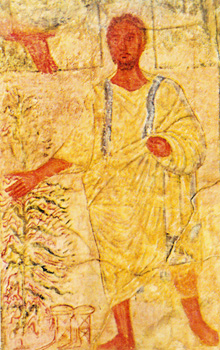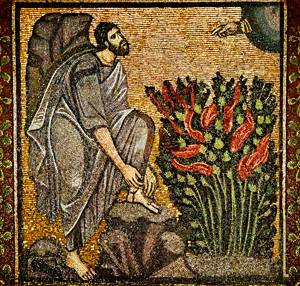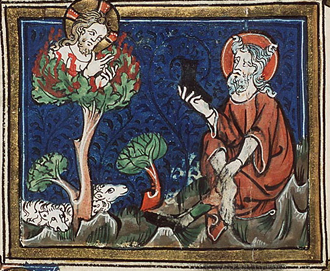From Our Archives
Debie Thomas, Losing and Saving (2020); Dan Clendenin, Moses and the Burning Bush (2017); and The "Sweet Miracle of Our Empty Hands" (2014).
For Sunday September 3, 2023
Lectionary Readings (Revised Common Lectionary, Year A)
Exodus 3:1–15 or Jeremiah 15:15–21
Psalm 105:1–6, 23–26, 45c or Psalm 26:1–8
Romans 12:9–21
Matthew 16:21–28
This Week's Essay
Exodus and Exile
The thirty-nine books that we Christians call the Old Testament were written across a thousand years, by multiple authors, and in a diversity of social settings. Despite the differences that you would expect in such a mini-library, they nonetheless all describe God's action in human history. But as the readings from Exodus and Jeremiah this week show, God doesn't always act in history in the same ways.
The two readings describe how the story of Israel revolves around dramatically different events. First, in a mighty act of God, after 430 years of bondage, there was Israel's triumphant exodus from Egypt some time around 1400 BC. Then, about 800 years later, there was tragic exile to Babylon in 586 BC. In fact, if you go to the British Museum today, you can read an account of the siege of Jerusalem in the Babylonian Chronicles — clay tablets with cuneiform writing that were translated in 1956.
These seminal events of exodus and exile ricochet throughout the Bible as two ways that God works in human history, and even in our own personal histories.
In her biography Moses (Yale, 2016), Avivah Zornberg observes that "no figure looms larger in Jewish culture than Moses, and few have stories that are more enigmatic or compelling." Moses was the chief protagonist in Israel's exodus from oppression in Egypt. We read about his famous call before the burning bush this week.
After an unlikely sequence of events in which God saved him from infanticide, Moses grew up in Pharaoh's household, at the center of political power. As an adult, he murdered an Egyptian for beating a fellow Hebrew, after which Pharaoh tried to apprehend him. So, he fled to the "far side of the desert" (Exodus 3:1). But God nonetheless called Moses back to Egypt in order to confront Pharaoh and liberate his people.
The exodus was a drama of liberation from oppression and exploitation, of miraculous deliverance, of God's mighty acts of power on regal display, of his dramatic intervention to shatter the enemy, work wonders, and break the powers of bondage. The exodus is mentioned throughout the Bible, especially in the Psalms, as a reminder of God's triumphant power to save, and celebrated at Passover even today by Jews.
 |
|
Moses and the Burning Bush, wall painting, Dura Europoa synagogue, c. 245 AD.
|
But exodus is the easy part, the part that we love and for which we understandably pray. In his new book called Why the Bible Began (Cambridge, 2023), Jacob Wright makes a counterintuitive argument — that it was precisely the long legacy of catastrophes in the history of Israel that produced its uniquely powerful Scriptures. In his view, the Hebrew Bible is "entirely a loser's tale." After its own civil war between the northern and southern kingdoms, Israel suffered successive defeats at the hands of Assyria, Babylon, the Persians, the Greeks and the Romans in 70 AD. The Hebrew Scriptures that eventually formed a Jewish national identity of belonging unique in the world are thus a sustained reflection on hope in times of humiliation.
The reading from Jeremiah this week is a prime example of Wright's thesis. He was the protagonist in Israel's exile to Babylon. When "the word of the Lord came to Jeremiah," Jerusalem was a war zone: "The army of the king of Babylon was then besieging Jerusalem." The enemy had breached the city walls, then "burned down every important building" — the royal palace, government offices, and the sacred temple that had served as the center of Israel's religious life for 410 years since Solomon.
They executed government officials. Soldiers plundered Jerusalem's national treasures, and everything of any value, both sacred and secular. The narrator's historical details are painful to read — "pots, shovels, wick trimmers, ladles, censers, and sprinkling bowls."
Dead bodies littered the streets. The book of Lamentations describes children begging for bread, and even cannibalism. The intellectual elite, the skilled workers, and artisans were deported to Babylon. The poor "who owned nothing" were left to fend for themselves amidst disease and famine.
The puppet king Zedekiah, who was only twenty-one when he was installed by the conqueror Nebuchadnezzar II, consulted with Jeremiah: "Please pray for us. Is there any word from the Lord?"
Yes, said Jeremiah, he had not just some political advice, but a word from God, but it wasn't anything that anyone wanted to hear. Surrender to Babylon. Give up. Don't fool yourself. Don't listen to the "reckless lies" and "false dreams" of your sycophants. This is the end of the end. Accept defeat.
Later, Jeremiah wrote a famous letter to the exiles in Babylon, detailing the implications of his doomsday prophecy:
 |
|
Moses and the Burning Bush, Byzantine mosaic, c. 9th century.
|
"This is what the Lord Almighty, the God of Israel, says to all those I carried into exile from Jerusalem to Babylon: 'Build houses and settle down; plant gardens and eat what they produce. Marry and have sons and daughters; find wives for your sons and give your daughters in marriage, so that they too may have sons and daughters. Increase in number there; do not decrease. Also, seek the peace and prosperity of the city to which I have carried you into exile. Pray to the Lord for it, because if it prospers, you too will prosper.' Yes, this is what the Lord Almighty, the God of Israel, says: 'Do not let the prophets and diviners among you deceive you. Do not listen to the dreams you encourage them to have. They are prophesying lies to you in my name. I have not sent them,' declares the Lord."
Such was Jeremiah's prophetic counsel: seek the welfare of your pagan conqueror! Pray for God's blessing on Babylon! Embrace your humiliating exile, for there will be no miraculous exodus.
Whereas Moses confronted enemy Egypt, Jeremiah confronted his own nation about their destiny with disaster. Deportation to pagan Babylon was unimaginable. Where were God's mighty acts of power? Was not Israel God's elect people? How could he relinquish them to a pagan enemy?
Exile to Babylon began a period of subjugation, servitude, banishment and captivity. It signaled abject failure, isolation, loneliness, and even punishment. Certainly it meant despair. But exile was just as much a place of redemption as exodus: "'For I know the plans that I have for you,' declares the Lord, 'plans to prosper you and not to harm you, plans to give you hope and a future'" (Jeremiah 29:11).
Moses and Jeremiah both responded to their respective calls with understandable protests about their personal inadequacies. They wrestled with the prospects of failure, with virulent opposition from detractors, and with deep discouragements. Moses is famous for his litany of fears — lack of confidence, limited skill, insecurities about personal identity, and fear of rejection (Exodus 3–4). For Jeremiah's forty years of faithfulness to God's call, he was beaten (20:2), received death threats (26:8), imprisoned (37:15), thrown down a well (38:6), and derided as an unpatriotic crank and traitor. Almost no one listened to him. He was a man of "reproach" among his own people (15:15).
 |
|
Moses and the Burning Bush, Michiel van der Borch, Koninklijke Bibliotheek, The Hague, 1332.
|
The callings of Moses and Jeremiah felt like impossible burdens, fraught with ambiguities. As Zornberg puts it, "there's a certain kind of reticence, or circumspection, that halts the true prophet, faced with the inscrutable God, whose revelation must be narrowed into what can be said."
No one in their right mind would think themselves worthy or capable of that call — or any call, for that matter. To speak the unspeakable. To name the Unnameable. The presumption. The audacity. The futility. To remove your sandals in front of a burning bush and stand on "holy ground." And so Moses rightly "hid his face, because he was afraid to look at God." And indeed, God warned him: "come no closer!"
Nonetheless, God insisted: "I am sending you to pharaoh to bring my people the Israelites out of Egypt." And when Moses doubted his deepest self, God assured him, "I will be with you" (3:12). In the reading about Jeremiah's own burdensome call, God promised him the exact same thing: "Do not be afraid, for I am with you" (Jeremiah 1:8, 15:22).
Such is the paradox and burden of prophecy, observed Martin Buber: "It is laid upon the stammering to bring the voice of Heaven to Earth."
NOTE: for a review of Why the Bible Began, see Adam Gopnik, "The Biggest Losers" (The New Yorker, August 28, 2023).
Weekly Prayer
William Cowper (1731–1800)
God moves in a mysterious way,
His wonders to perform;
He plants his footsteps in the sea,
And rides upon the storm.Deep in unfathomable mines
Of never failing skill,
He treasures up his bright designs,
And works his sovereign will.Ye fearful saints, fresh courage take,
The clouds ye so much dread
are big with mercy, and shall break
In blessings on your head.Judge not the Lord by feeble sense,
But trust him for his grace;
Behind a frowning providence,
He hides a smiling face.His purposes will ripen fast,
Unfolding every hour;
The bud may have a bitter taste,
But sweet will be the flower.Blind unbelief is sure to err,
And scan his work in vain;
God is his own interpreter,
And he will make it plain.William Cowper (1731–1800) was a British poet and hymnist. He struggled throughout his life with depression, doubts, and fears.
Dan Clendenin: dan@journeywithjesus.net
Image credits: (1) Textweek.com; (2) Iconreader.wordpress.com; and (3) Blogspot.com.





